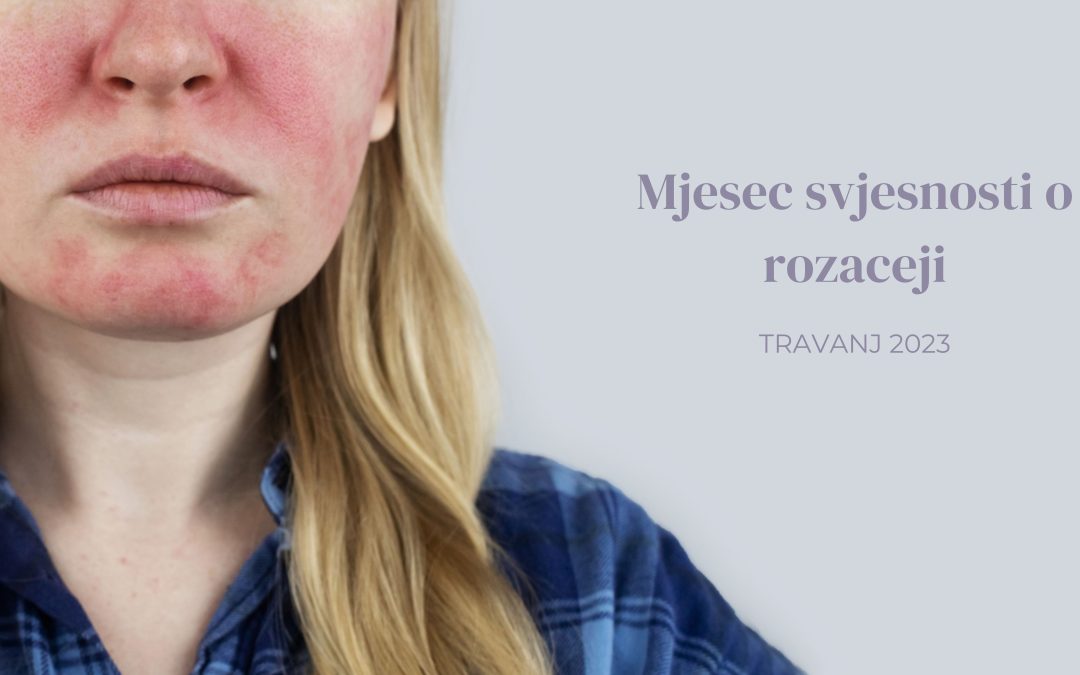Travanj je mjesec svjesnosti o rozaceji!
Ovaj mjesec podižemo svijest i razumijevanje o tome što je rozaceja i kako je liječiti. Razumijevanje rozaceje uvelike je napredovalo posljednjih godina, ali znamo da postavljanje dijagnoze i pronalaženje odgovarajućeg liječenja još uvijek može biti muka!
Ključne činjenice:
Što je rozaceja?
Rozaceja je medicinski shvaćena kao bolest – točnije, kronični poremećaj kože lica – sa širokim spektrom znakova i simptoma koji pogađaju milijune ljudi diljem svijeta svake godine.
Tko dobiva rozaceju?
1 od 10 ljudi u Velikoj Britaniji ima rozaceju! Javlja se i kod muškaraca i kod žena; češći je kod žena, ali simptomi su često teži kod muškaraca. Svijetli do srednji tonovi kože imaju češću tendenciju rozaceji.
Kada počinje?
Iako se može pojaviti u bilo kojoj dobi, vjerojatnije je da će započeti nakon 30. godine, a s godinama može postati upornija. Mnoge su žene otkrile da je menopauza veliki okidač.
Što uzrokuje rozaceju?
Točan uzrok rosacee još uvijek nije poznat, iako postoje različite teorije. Nedavna istraživanja sugeriraju da dolazi do upalne reakcije na koži, što rezultira proširenim, oslabljenim kapilarama, što pak rezultira različitim simptomima.
Koji su simptomi?
Rozaceja se može različito manifestirati kod različitih ljudi, no postoje neki uobičajeni simptomi:
- Crvenilo na obrazima, nosu, bradi ili čelu
- Male vidljive kapilarice na licu
- Kvrge ili prištići na licu
- Suzne ili nadražene oči
Ako mislite da možda patite od rozaceje, pronalazak dobrog dermatologa može vam pomoći da se riješite simptoma. Iako trenutno ne postoji lijek, definitivno postoje stvari koje možete učiniti kako biste smanjili crvenilo i nelagodu te iritaciju kože koja dolazi s tim.
Najbolji savjeti za održavanje mirne kože sklone rozaceji:
- Izbjegavajte uobičajene iritanse kože u proizvodima za njegu kože ili barem pazite da koristite proizvode posebno namijenjene osjetljivoj koži. Osjetljiva koža i rozaceja često idu ruku pod ruku, stoga svakako izbjegavajte sve što sadrži jake kemikalije i pokušajte koristiti nježne alternative gdje je to moguće.
- Hidratizirajte! Održavanje kože hidratiziranom ključno je u borbi protiv izbijanja rozaceje. Obavezno namažite osjetljiva područja nekoliko puta dnevno. Odlično je ako vaša hidratantna krema sadrži protuupalne sastojke poput Rosalique kreme.
- Pobrinite se da vaša prehrana bude bogata antioksidativnim i protuupalnim namirnicama, poput maslinovog ulja, zelenog lisnatog povrća, zdravih masnoća, poput onih koje se nalaze u masnoj ribi, kao i puno voća, poput jagoda, rajčica i naranči.
- Pazite s izlaganjem suncu. Pobrinite se da nosite najmanje SPF30 kremu za sunce tijekom dana, kako biste bili sigurni da vaša koža nije pod utjecajem UV zraka. Rosalique sadrži SPF50, pružajući vam obilje zaštite!
- Ograničite hranu koja pogoršava stanje vaše kože. Uobičajeni okidači za osobe koje pate od rozaceje su alkohol, topli napici, začinjena hrana, rajčice, čokolada i mliječni proizvodi. Pokušajte otkriti koji se okidači smetaju vašoj koži!
- Ono najvažnije: nemojte se sramiti! Lakše je reći nego učiniti, znamo, ali važno je zapamtiti da su nedostaci naše kože mnogo očigledniji nama samima nego bilo kome drugome. Milijuni ljudi bore se s istim stanjem kože, a ako vam treba malo potpore, tu je Rosalique 3 u 1 čudesna formula protiv crvenila SPF50.
Nadamo se da vam je ovaj članak dao neki uvid u to što je rozaceja i kako utječe na ljude. Nevjerojatno je važno zapamtiti da ste lijepi u svojoj koži, kako god izgledali. Ako imate pitanja ili nedoumica u vezi s rozacejom i Rosaliqueom, ne ustručavajte se obratiti nam se!


Recent Comments